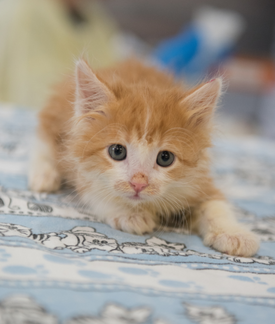
Best Friends experts share more tips on preparing for kitten season
A few weeks ago, we featured a town hall where three Best Friends experts—Brittany Sorgenstein, executive director of the Los Angeles program; Carrie Lalonde, manager of lifesaving programs in Houston; and Tammy Jo Hallman, municipal and shelter support specialist—talked about everything you need to know to get your kitten program ready for the upcoming kitten season.
For those questions asked in the chat that didn’t get addressed during the town hall, Brittany has answered them below!
How do you suggest we expand our 100% foster-based program—should we be branching out into creating a brick-and-mortar? I think oftentimes rescues with a facility can pull kittens from the shelter, do an initial intake and, if needed, the kittens can stay there if a foster isn’t lined up to take them. We don’t have that option for kittens to hang out if fosters need to return them, or temp holding while they are waiting for fosters to show up.
 While having a central facility can be helpful, it also can be detrimental to lifesaving because it does not create the same sense of urgency to keep kittens moving into foster homes. It’s also very expensive!
While having a central facility can be helpful, it also can be detrimental to lifesaving because it does not create the same sense of urgency to keep kittens moving into foster homes. It’s also very expensive!
I recommend setting up a “fosters on deck” list so people can be called on quickly to pick up kittens. You can add people’s names, contact info and what “type” of kitten(s) they can foster (e.g., medical, mamas and kittens, ringworm, short-term). Your organization can also use this list to move kittens around if a foster needs to go out of town or returns suddenly.
Often people think they need to foster for a certain amount of time, so may not want to commit. Asking people to short-term foster gives you the opportunity to get kittens out of the shelter quickly. I know of one organization that has a “kitten squad” of four to five people who agreed to be on call to take in kittens at any time for temporary foster until a “permanent” foster could be found.
If you are completely foster based, where do you do intake procedures?
We find costs inflate if we do all this at a vet, so we try to work with the shelter where we are getting the kittens to do as many of the intake elements as possible (e.g., weight/temp, evaluating for parasites and ringworm).
If you are doing intake exams at a private home (staff, volunteer or foster), a folding table that is sterilized between kittens can do the trick! If you can get supplies donated, fosters or volunteers can do intake procedures in their home or as soon as you leave the shelter.
How can we help our only staff member working as the foster program coordinator, who is finding themselves on call 24/7? We are trying to find ways to help fosters become better problem solvers and encourage them to contact each other before contacting the coordinator for non-urgent medical concerns. What’s your best recommendation to help cut down on their after-hours work?
This is a perfect opportunity to set up a foster mentor program. Like you said, contacting each other is a great idea, but pick a couple of fosters to focus on and invest in training them as your main foster mentors. At Best Friends, foster mentors sign up for “shifts,” which basically means they are on call for other fosters to contact them with questions. You might also set up a Facebook group where experienced fosters can answer questions quickly when people have concerns or issues.
We also use a triage flow chart system that fosters can use to identify what may be a true emergency, and what can wait until “regular business hours.”

Is there a benchmark for the number of foster staff an organization should have based on the number of foster volunteers and/or animals in foster?
We do not have an exact ratio of staff to fosters, but it’s good to have 50% of your kitten population in a foster home and that should help you determine the workload on staff. We try to keep only the most severe medical cases on-site to cut down on the amount of work a staff coordinator will have to do in terms of supporting foster parents.
How do you assign mentors? Should they be available to everyone, or only have certain people assigned to them?
Our mentors are available to everyone for phone calls, questions, etc. When we have mentors sign up for shifts, we match those shifts to when new bottle feeder volunteers or fosters are coming into the facility for onboarding. This helps the mentors build relationships.
Not everyone will utilize mentors, but all fosters should have access to such a resource.
We are a new, very small organization that consists of four people who all have other full-time jobs. Any tips for jump starting a foster program? We find the barriers to fostering our kittens are supplies and vet care, but we are always hemorrhaging money so it’s a difficult thing to overcome.
 If you haven’t set up an Amazon wish list or posted your supply needs to social media sites and NextDoor, you should! You can even place paper flyers in local shops, including pet supply stores where people can easily purchase what you need.
If you haven’t set up an Amazon wish list or posted your supply needs to social media sites and NextDoor, you should! You can even place paper flyers in local shops, including pet supply stores where people can easily purchase what you need.
Vet care is a struggle for everyone right now, even well-established programs. I recommend asking for direct veterinary fund donations via a website, PayPal, etc. Go Fund Me pages can be helpful, too, especially for kittens with severe medical needs. These can be either unique situations, like a kitten who needs surgery for an injury, or regular needs, like a spay/neuter fund.
Ask local Girl Scout or Boy Scout troops to do donation drives for blankets, bottles, kitten milk replacement formula, or anything needed for your kitten kits. If you are just starting out, focus on a population of kittens that you know you can help or those that typically don’t need vet care, like moms and babies or older kittens as opposed to neonates.
How do you deal with the possibility of disease when fostering out animals at a mobile event (since you haven't yet done intake on them)?
While we may not have an official medical intake exam, we do give the kittens a “once over” before any event. Staff and volunteers with a good amount of kitten experience typically know what to look for.
We also give our foster information on how to triage medical concerns and offer support if something does come up. We feel that a kitten is better off in a foster home rather than a shelter, even overnight, where they are more likely to get sick. Best Friends has a medical resource for kittens that can help.
Should kittens interact with the foster’s household pets?
This depends on your organizational comfort level, as well as health, vaccine status and behavior of the kittens and the household animals. Ultimately, we want everyone to stay safe and healthy. We typically ask that foster kittens are kept separate from household pets, but I know that can be challenging at times.
Do you cut people off from fostering non-stop? If they're not practicing self-care and take one after the other, should we say no?
If we recognize that someone is struggling or has had a couple of tough litters in a row, we have a conversation with them. We reassure them that we will work with other fosters and groups and never make them feel that they are this kitten’s only hope. These situations are not black and white, and we feel compassion, understanding and a good ol’ heart-to-heart often does the trick.

How frequently should we check in with fosters and what types of questions should we ask them?
We give fosters a lot of info and resources when they pick up their kittens, but we also make it clear that they can reach out to us about anything, anytime! They are required to bring the kittens in for vaccines every two weeks, so that is a good time to talk to them about how things are going as well.
If they are first-time fosters, or have a particularly tough litter, we may reach out via email or phone sooner and more frequently. Standard questions could include “Are the kittens eating well and gaining weight?” “Do you have any concerns about the kittens?” “Are the kittens active?”
How do you help foster parents with the grief of their foster animal passing away? We have lost many fosters who have feared that they would lose more animals.
Animal welfare is trying, and often leads to compassion fatigue. I have sent compassion fatigue resources and had open conversations with fosters in the past. Most of all, be empathetic and understanding and let them know they are not alone in their grief. It's also important to focus on the ones that made it. While they have lost one, and that's traumatic, by fostering they are saving the lives of many other kittens who otherwise are at risk without their help.
Foster mentors can be helpful with this as well. You may also try to set them up with sturdy or older litters in the future. Often people just want to feel heard and to know they didn’t do something wrong, and that everyone has some heartache when caring for this vulnerable population.
For additional information about managing kitten programs, see the following resources:
Kitten kits help the public participate in lifesaving program spotlight
Kitten programs 2.0 part 1 and part 2 program spotlights
Best Friends podcast – episode 10
Best Friends podcast – episode 99
Kitten season: when cute and cuddly meets lifesaving vlog
If you enjoyed this program spotlight, you can find our complete catalog of spotlights here.